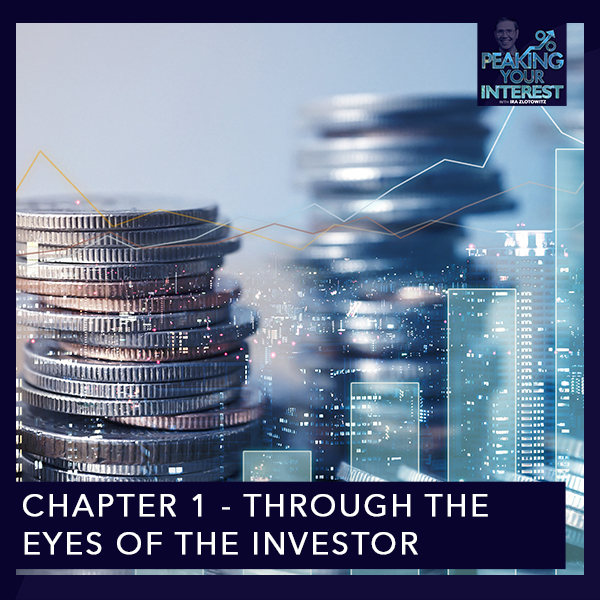Peaking Your Interest: The Introduction
- On February 17, 2020

The real estate business can often be byzantine and difficult to comprehend, and you wouldn’t be alone in thinking that. But under the wing of someone who has years of experience in the industry, it’s not so hard or lonely. Ira Zlotowitz gives you a Real Estate 101 here on the first episode of Peaking Your Interest. If you’ve ever found yourself hesitant about entering the industry because of the difficulty of the concepts, now’s your chance to change that. Your journey to real estate success begins here.
—
Listen to the podcast here:
Peaking Your Interest: The Introduction
A Brief Overview And Some Background Information
This is the first episode of Peaking Your Interest. I want to give a little bit of an introduction about what the intention is. The plan is to take the many years I’ve been focusing on commercial real estate and educating a lot of people within Eastern about the general real estate market. A couple of months ago, an idea came up to take all the courses, bringing into 2020, break it out from the beginning and touch every topic and go through from left to right but in order: the first part, the second part and the third part. It was a big project to do. There are a lot of people working on the team. We broke it out and now we’re going to distribute it via podcast on EasternUnion.com and on YouTube as well.
What You Need To Know
The idea is as follows. In the first season, I’m going to give the real estate course focusing on what you need to know in real estate. It’s the same theme that I’ve done in the past. The difference is I’m going to cater and speak as if you’re three-plus years in the business. The second season that I’m going to do is going to take all the words that require a lot more detailed explanation and have one topic each, one definition. Take NOI, now I’ll say Net Operating Income, the profit of the building. When I’m going to explain it individually, I’m going to go off on it on a detailed tangent of NOI, how underwriting works. This way if you know what NOI is, it will flow. If you want to get more detail of NOI or cap rate, I’ll break it off from there. I found from the feedback that most people like the courses because it gives you what you need to know from a bigger picture, practical experience. It’s focusing on the different angles of the business itself.
I’m going to start now and I’ll keep developing it together with you, the comments and feedback from the group that’s here. We named the course, Real Estate 101. It’s understanding the art of real estate. A deal is only as good as the financing it gets. That’s always been the mantra that I went with. When you watch people buying real estate, as I’m going to go into the course, it used to be about bricks and mortar. It used to be about the bricks. In buying real estate, someone’s looking at a building. I used to tour buildings with old-time owners. We used to look at the building, what condition the actual building is and how much it would cost to replace it.
We looked at what we call the bricks and the mortar. What are they getting? How many square feet? What is it worth per square foot? What changed over many years and a lot more recently? That’s why one of the things we redid is the Eastern Union app. We spent over $100,000 to build the only underwriting app at this time. I’m sure there will be followers, but right now that is the only way you could underwrite a deal from an app. From the palm of your hands, you could figure out the value of a building, all the monthly payments, all the way through the IRR and eventually the waterfalls between partners.
What I’ve noticed is that when I came into this business, I started going to meetings with someone. The first time I went out of New York, I’m underwriting a deal. According to the underwriting numbers compared to New York, the building was worth $6 million. I meet the borrower and I tell him, “Your building is $6 million.” He’s buying the building. I said, “I could probably get you a mortgage at that time, at 80%. I get you a mortgage of $4.8 million at 80%.” I was getting the mortgage and I thought he bought himself an amazing deal.
It’s interesting. I tell people in that city that I’m working on that original financing. The guy turned to me and says, “Are you crazy?” The guy who bought it overpaid. It’s not worth $6 million. It’s only worth $25,000 per door, per apartment that’s in the building. Based on that, it should be worth only $5 million. I’m thinking, “I don’t know who’s right.” What makes it worth anything? Many years later, the world focuses based on the financing, based on the structure.
That’s what I’m going to teach you, how to look at the real estate business from all aspects and be able to come up to a conclusion. What is this building worth to you? Based on explaining, what does that mean? Does it mean you get messed up because someone else has a different value? Over this course, over all these chapters we’re going to go through, we’re going to explain it. The table of contents, the whole course is broken down into eleven different chapters, eleven different parts. The first one is going to be the introduction, which is now. The next one is going to be Chapter One.
Perspective number one, through the eyes of the investor. In order to be successful, you have to understand everyone around the table, the investor, the person with the money. What are they doing with their money? What are their options for money before real estate? Understand why they segue into real estate and when they segue into real estate. Perspective two is through the eyes of the syndicator, the person buying the real estate and putting the deal together. What is his motivation? What’s her motivation? If you understand it a little bit clearer, you’ll be able to understand how that comes together with the investor, whether their motives are aligned or not aligned.

Real Estate Business: In order to be successful, you have to understand the investor, the person with the money.
All the property types and descriptions of those properties is Chapter Three. Chapter Four is underwriting an income-producing commercial real estate deal. I’m going to go through step by step. One of the things which will make it much easier for all of you is that when you download the Eastern Union app, you’ll be able to see a full-fledged Eastern Union calculator, which will allow you to do the full underwriting and make it much easier. As we’re talking, you can plug in the numbers in a very easy format.
Chapter Five are the three most important questions to ask. I teach people over all the years is that they look to buy real estate, but sometimes people focus on the wrong direction. The part I’m going to go through and explain is that one thing that I have is more experience than anybody else and it’s not a holy statement. In my business, I’m a mortgage broker. I’m a trusted advisor. I only get paid when I close. I’m trained in the art of looking at a deal, looking at a situation and saying, “What could possibly go wrong?” Based on what could possibly go wrong, I could focus on that point in advance. For example, when I would ask someone, “Can I please have the opportunity to work on your deal?” The person would say, “Sure, why not? You want to get me a bid? Why not? You can go get me an offer from a bank.” I learned to say, “What is the best offer you have now? What does it take to win?” If I can’t win the assignment, I’m not going to start.
Using that same concept, when you’re buying real estate, you’re at the same boat as I am. You don’t make any money until you close. We’ll go into it. It could be worse. You could lose money in the process. I’m going to show you what’s the order of questions you should focus on to eliminate a lot of the wasted time and bring yourself to focus to be successful. Chapter Six is creative financial structuring. As I said before, a deal is only as good as the financing it gets. If the rest of the industry is paying 4% and you’re paying 3%. If they’re paying for equity 9% and you’re getting it for 8%, 10% to 12%, that can be the difference of buying yourself a better structure and a better deal.
Chapter Seven are the main contracts. What are all the contracts involved in the transactions? Where do you need legal advice from? What’s the main thing to look out for? Chapter Eight is going back to the third perspective, through the eyes of the lender. If a deal is only as good as the financing it gets, clearly it’s going to be based on how the lender looks at it also. You want to make sure you understand how a lender does business and why a lender does business. The ‘why’ is very important. In general, I tell people, “You’ve got to understand the why.” Don’t just do things. What do I have to do and why? Understand the ‘why.’ If you fully understood why the investor’s investing their money in real estate? Why the syndicator is doing this deal? Why the lender is coming to the table and what do they need to make?
If you figure it all out, you could structure amazing financings not just on the mortgage side, but all the way up to capital stock at 100%. The bank will get you to 80% and the equity, the investors will get you the other 20%. Chapter Nine is going to focus on bridge lenders and syndicating bridge loans. That’s going to show you when they have a deal that a regular bank will not finance, how to structure financing work. From there, be able to build out that part of the business. When I got an understanding of the behind the scenes on the bridge lending, how that works, that’s why I formed the IRA Group, which brokers participation in hard money loans. Chapter 10 is financial structuring and leases under underwriting. I’m going to show a lot more creativity. That’s like extra credit. I’ll show you examples where someone has able to use creative knowledge of financing and financial engineering to make a great deal even better.
I want to go off and talk about disclosures a little bit. I’m not an attorney. I’m not an accountant. I’m not a financial advisor, and for those that are Jewish reading this, I’m not a rabbi either. If you’re doing loans, you’re making a loan yourself or you’re borrowing loans and there are maybe potential issues. I’m just giving this course for illustration purposes. If you need legal advice, if you want to raise money, you get a securities attorney. If you’re buying real estate, a real estate attorney, if you want to speak to an accountant to get financial advice, go to a financial advisor. This whole course and the whole show is totally for educational purposes, but please make sure that you’re not trusting things as definite here.
It’s concepts you can apply in real life by getting the approvals from the people that you’re trusting on the legal side and the professional side of things. There are tax benefits to owning real estate versus lending for real estate. I’m not going to mention them in this course. I’m going to have a little bit on a tangent, but when I’m going to be discussing the whole course, I’m discussing more on the gross profit margins. Which one is better taxes and down to the last tax benefit? I’m not going to be focusing on that end of it.
A little bit about myself. In May of 2001, I found Eastern Union. Eastern Union is known as America’s most trusted advisor. We took that title as our tagline when we first opened because as the market’s going to change, maybe people can get better rates or lower rates over the course of time. We could open up an equity division. We’ve got a sister company that does equity division. Laws could change that allows us to do different things, but one thing would stay true. We’re always going to be the trusted advisor. We will always have the client’s best interest.
Real estate is a numbers game based on financial engineering. Click To TweetWhen I came into the business, my dad had passed away. He brought me up going to business and said, “You always have to go ahead and play the long game. In this world, you have one thing, it’s your name. You never want to risk your name. As such, you want to make sure you’re giving the best advice. You’d rather lose the battle and win the war. Don’t look for the one deal. Look for the long term.” It was tough when Eastern Union first started and you’re thinking, “It’s one year in, two years in,” but we’re talking about 18, 19, 20 years. I thank God for that advice and that decision to be known as America’s most trusted advisor.
We weren’t shooting to be the top production, but thankfully now, we’re the tenth-largest company in the United States based on loan volume, based on 2019 totals. We’re number two and number three in the number of transactions. We closed $5 billion and less than $5 billion in each of the last two years. We’re talking about doing almost 1,000 loans. Many of our competitors that broke the $5 billion mark, with that range, they will deal with larger deals. We want to stay true to our roots. Our roots to be honest, remember the clients and how we got here. We’ll always do some larger deals. At the same time, we’re doing a tremendous number of smaller deals.
We work on debt through our sister company on equity. We work on bridge. We work on healthcare. We could place every property type in the United States at any type of structure to be able to go ahead and get it done. In April of 2019, I started the Ira Group. The Ira Group is to broker participation in hard money loans. As we’re finishing off this first segment of the intro, I want to end where it’s a little bit repetitive. I went chapter by chapter. I want to take a little bit dynamic, a little bit different.
When I came into business and I did research on, who are the most successful owners? Who are the most successful mortgage brokers? Who are the most successful sales brokers? What I learned is that those who are the most successful learned to appreciate all the angles of the game. They understand all the people involved and what their motive is, how they make money, and how to become more successful. By doing so, it helps to understand where you have room to strike a deal. If inevitably something goes wrong, something comes up, something has to get retreated, how do you deal with it? If you fully understand the behind-the-scenes metrics of each person, you know how to go ahead and strike a deal.
Real estate became a numbers game based on the financial engineering, the bricks and mortar, as I said before. That means that if you understand all the players and you understand how to a structure a deal, a deal could become a better deal. It will give you the better returns you make. The terminology was used to be, “I’m buying a building at this amount per foot.” It’s 100,000 square feet. If I’m buying it for $1 million, 10,000-foot. If it’s $10 million, it’s 100,000-foot. You could argue the value of the bricks and mortar and the location. Those are the discussion points. For the most part, those things play a role at some level. It’s more about, “I’m buying a deal and it’s throwing off 8%, throwing off 10%.” Forget about the fact that people don’t even know how to calculate it. Until now, we came out with Eastern Union app that will allow you to calculate the cash and IRR from the palm of your hand. That’s what drove a deal.
I’m listening to people buying all over the country. Technology is getting involved in everyone’s life. If you look back a few years ago, when we first started developing our technology, the app was so foreign to people. Do you think people are going to buy real estate online? Do you think people are going to bid for commercial real estate through an app and talk through technology? Thank God we had that vision as a firm. We were leading in tech and data.
Technology will never replace the full human being. It will always be about half human and half machine. With the half-human, half-machine, the best analogy I give is that if we’re working on 100 transactions and have ten processors, each of them are working on ten. What happens if I give each of them better technology, better systems. Because of the systems that they have, they’re able to now handle fifteen each. To maintain the same 100 deals, the company only needs seven processors. They’ll even have some more time on their hands because each of them can handle fifteen, it’s 105, some of them won’t be at capacity.
Did technology replace the other three that are no longer here or the technology enabled the seven that are here to do even more? I look at it an enabled. We utilize technology with artificial intelligence as a firm to be able to grow the business. What I’m finding now is that clients all over are trying to embed technology in the different aspects of their business, “Is technology going to replace me? It’s not going to replace me. Would the world need the same number of me’s? I don’t think so.” It’s going to evolve. It’s going to change.

Real Estate Business: Deals die or move forward depending on whether the people involved understand everyone else’s motivation.
Data is going to make a big difference. When you could have a landlord told me hide some of the data analytics in their office. They own thousands and thousands of units. They ran a report based on to calculate and they said they never focused this way. How much money does it cost them on fuel down to the last unit in a certain area? Usually, it’s building by building. When they saw the difference of one building compared to the next in their own portfolio, they started doing research.
What a difference in that area do they charge tenants for certain expenses and not certain expenses? They realized they were able to increase their rents by charging a fee of $30 a month per unit for a certain fee based on the market without changing anything else. That was money straight to the bottom line. It’s utilizing technology and data. What allows someone to sit and understand what’s going on in their neighborhood? They use different programs, different software, different data programs, whether it be on Octovio, Rianimi, CoStar. These are software technology that once you’re using them and others, you could do the same amount of business and research in your backyard as easily as the rest of the country so that people started to buy nationwide.
Once it’s on financial engineering, you can make a mistake in underwriting but it’s financial engineering, the focus is more, “Why should I buy in this area and earn a 10% return cash-on-cash when I could buy in a different area and earn 14% cash-on-cash?” Are there differences that I’ll learn through the course? Yes, but there’s a part of the data and a part of the technology that people say, “Let me utilize it and I’ll figure things out. It’s worth the extra risk, even if it doesn’t perform as great at fourteen. I only get 12, 11, it’s still better than the ten.” What I want to go now through is give you a list of all the different players in the game and touch upon a little bit of each of these players and what they do and where their role is.
The first play in the game is the seller. He’s selling real estate. He’s selling the deal. If he wasn’t selling the deal, there’s nothing to buy. Why is he selling the deal? The main reason he’s selling a deal is because he probably got tired of that business plan or he reached his goal in his business plan. I used to think when I came into business like, “If a guy’s selling a building, it can’t be a good deal for the seller and a good deal for the buyer.” I learned over the years, it could be a good deal for both because many people buy real estate, buy something for a certain period to accomplish a certain goal.
Once they hit that goal, they want to start again. The best example I’m able to give is as follows. Every single building starts with a piece of land, as a piece of rural land. They put the land together. They get approvals and do construction. They build it. They rent it up, etc. When you buy a finished building, the returns you make are 8%, 10%, 12%, whatever the deal is going to throw off at that time. Somebody who buys land takes a lot more risk. They might not get the approvals. They might take them several years, but when they’re finished several years later, they could have put $500,000 into a deal and now sell it for $2 million.
They’re selling the finished building to someone who doesn’t want to take the risk of buying the property to begin with. That’s a clear example. He bought his land. He only develops land. Sometimes I meet people that are selling because the guy tells me, “I used to buy smaller buildings. Whatever small is relative, under 20, 50 units. It’s too much of a headache. I own 30, 10, 5 buildings this size. I’d rather sell them and buy a bigger building.”
He doesn’t want the headache. Along comes someone else that’s newer in the business, it’s taking over that position. Understand why the seller is selling. When you understand why the seller is selling, if something comes up later in the deal where you have room to negotiate, where you don’t have room to negotiate. If the seller is desperate to get out, they might not have room to give an extension. If someone’s not as desperate, they might take a better price and it takes a little longer to sell. They may do different things they want to accomplish, take a lease sold, they can do different structures.
When I meet people who bought themselves a great deal, it’s because they knew what was important to the seller and deliver it to the seller. A great example is a person buying a building. It was a $13 million deal. He got himself $12.5 million price and got $500,000 discount. I asked the person how did he do it. He said, “I was talking to the seller and the deal is on the market. I realized the most important thing to the seller. The seller had another opportunity to buy another building.” The seller needed $1 million, $2 million in order to go hard to buy another building. He said, “I struck a deal with the seller.” I said, “If you sell me the deal for $12.5 million, even though my attorney advised against it, I will go to contract. I will go hard. I will release you the $2 million, even though it didn’t close yet. You could use it to buy your other building.”
Technology will never truly replace the full human being. Click To TweetThe seller in turn said, “I didn’t have to take a pawn. I was able to buy the other building without a pawner. It was worth selling this for $13 million to $12.5 million, losing $500,000. Over the lifetime of the other building, give away millions of dollars.” That’s understanding where the seller is coming from. This is a key piece to understand. A real estate broker makes money as a commission salesperson. It’s similar to myself as a mortgage broker.
They make money when they close. They are not interested in a deal that’s not going to close. They don’t want to spin the wheels. They don’t want to waste their time. It’s their interest to believe and know that you will close and get the certainty of execution. If you’re going to build a relationship with a sales broker, understand that’s what they care about. They care about making the best commission with certainty of execution. Therefore, what’s important to them is you don’t waste their time.
Someone told me when I came into the business a long time ago, they first came in and the first thing they said, “There’s always yes, I’ll try, maybe or no.” That’s how most people operate. Yes, I could do it maybe or I’ll try and then, no. I told him it’s not the way it works. It’s yes, I could do it or no. I’ll try, that shouldn’t exist. If that’s the case, you want to be able to call up a sales broker and say, “This deal, thank you very much. It’s not for me.” At least they know when you finally tell them, “I’m ready to move forward, I’m ready to close.” They’ll trust you. It’s certainty of execution. They’re going to go ahead and earn that commission.
Many times, these transactions, I’ve seen deals die or move forward because people understood everyone’s motivation, sometimes even internally in an office. Think about a sales broker. A sales broker brings in a listing and they’re supposed to split the commission with the house. Let’s say it’s a 50/50 split. The commission is $100,000. That sales broker makes $50,000. The company they worked for makes $50,000. What happens if someone in their company brings the buyer? In many firms, they have to split that $50,000. Many times, you could have a sales broker who’s listing a property and you’re calling up the sales broker through another broker in the shop.
For some reason, they’re willing to listen to your bid. If you wouldn’t, then pick up the phone to the selling sales broker and say, “I know that you’ll have to split this commission. How much are you losing?” Often in the loss difference, fully disclosed, many times, they’ll start working with you because they don’t care who they sell to. They want certainty of execution. Sometimes the broker pushes a buyer that’s not the best buyer, but it’s the best for their pocket. I’m not saying that they’re bad people. My mother brought me up don’t judge someone until you’re in their shoes. You have no idea what you would do when you’re sitting there and the difference could be a few hundred thousand dollars.
You’re being honest, you’re saying your opinion. Are you nervous about it? I’m not nervous. What are you going to listen to? If you understand where they’re coming from, it’s a lot easier to negotiate and talk to them. The real estate syndicators are those that are buying the deal. We’ll get into that much more. They’re the main people that buy real estate. They’re the people who put the deal together. They’re the syndicators. How do they make money? They make money primarily when they buy a deal, primarily when they refinance a deal and if the deal hits when they sell it, the deal hits the home run. They don’t make that much money through the process.
The Business Of Real Estate
They’re not in the business of managing real estate. They care to buy deals. Their motive is to always find new deals to buy and be in the business of buying. For them, the worst thing is if this activity slows them. If they can’t find deals, that’s not where they’re making a bulk of their money. Limited partners are those that are coming into a transaction. They could be doctors, lawyers, accountants, business people that have money. They don’t want to deal with the headache. They say, “Instead of dealing with the headache, I’d rather make less on the upside but I’ll invest, I’ll take equity risk,” but they will not say, “I’ll invest with the syndicator.”
The syndicator on the other side says, “I’ll take the risk. I’ll put my reputation on the line. I’ll work the deal. I only make my real money when I turn this into a home run. I’ll make some money on the buy, but the main money is going to be when I sell this off later on.” The conventional and bridge lending is understanding how the lender works. Why is the lender making money? What’s their motivation? When you understand what their motivation is, you will be able to get a better appreciation for what you can negotiate or what you can’t negotiate.

Real Estate Business: If you’re buying real estate, you have to know all these pieces and understand where they come from.
To give you two examples here. The banks lend out the money from the deposits. They take deposits in, they pay an interest rate on that. They lend it out and they keep the profit. They don’t want to take any risk. When they come into a transaction, they’re going to do that first transaction and set the deal up. The most important part of the puzzle for them is they want to make sure they’re not going to have a risk, but they need more deposits. I have a client who went over to a bank and was able to deposit money in the bank, has money from his business and whatever other banks. He came to this new bank to do a loan. The bank wasn’t that happy to go do him a favor. The credit was fine but they’re like, “Why should I do you a favor?”
He told the bank, “You need deposits. I have a business and a few million dollars in my account. Instead of banking where I bank, I’ll move it to you. I’ll become one of your better depositors.” The bank said, “Yeah, you’re putting money into my account. We have a relationship. I’m going to do a favor for you.” From this client’s end understanding it, he was able to get a much better interest rate, not because the bank did something stupid for him. It was a bridge loan at that time. The bank had a rate for his deal at 6%, but they only wanted to do it for VIP clients. They were fine at 6%. He became a VIP by putting a deposit in.
A bank would have called him, “Do you want to switch your account? No.” He said, “I put millions of dollars in deposits. I’m making the same interest rate on the same deposit rate they’re paying in the branches. On top of that, I was able to borrow money at 6% instead of 8% or 9% from a different bank. Let me go ahead and do it.” Let me tell you the flip side of the story also. I had a client that had a deal when one neighborhood in Williamsburg, New York started to go crazy in valuations. He was selling the property for $60 million. He had a $21 million loan. He was never organized. He’s paying late every month. The deal is in contract to sell for $60 million. The loan is only $21 million. No one is taking a loss. The bank used to call him every month, upset, “Pay your mortgage. What’s going on?” The guy tells them, “I have an explaining to make. I’m paying them penalties. I’m paying them the default interest rate. Why in the world do they care? If I paid them up tomorrow, they’re going to take my money and lend it out at 4%, 5%. Aren’t they happy I’m paying them 12%, 14% plus fees?”
You don’t understand. A bank is not in the real estate business. They’re not on the business of buying real estate. They’re on the business of renting money. They take from deposits. They lend it out. When they have to show on their form a box that says anyone delinquent, yes. A $20 million deal when the average deal in the portfolio then was $10 million or less, it’s a red flag to the regulators and they have to put a reserve account. Who knows what? No one looks at the underlying, this one deal is not going to take a loss. It’s in the aggregate of what’s taking place.
The mortgage broker, that’s myself. I make money when I close. I charge a few when I close. My role in this transaction is that everybody is able to go to a bank and do themselves. Everybody could do anything they could do themselves. Anything that anyone’s doing, they could do themselves. The difference is number one, the level of expertise that I have in knowing exactly how a bank wants to see the deal. Number two, which bank is the best-suited bank and spending the time to date the banks throughout the whole market to make sure that everything is the best suited for this borrower, and then leveraging the competition to bring them the best deal. My motivation is to work on a transaction that I can provide value and I could close. If I can’t provide value, I’ll say no upfront and I won’t move forward.
The attorney in the game. The attorney is the person that has one job. Their job is to make sure that if there’s ever going to be a legal problem later on that the borrower goes into the transaction understanding all the risks involved. I want to say a very important thing. This is not an insult or a compliment to either side of the table. It’s a statement of fact. An attorney is not your business advisor. An attorney is there to tell you all the risks involved, risks and rewards. You are the owner. You’re the entrepreneur. You’re the borrower. You’re the businessman. You make the business decision.
They’re there to tell you the risk. When I meet a client that tells me, “My attorney said I shouldn’t do it,” to a large extent, I’m laughing in that statement. There’s a reason why this person is an attorney and there’s a reason why this person is a borrower. I know people could take this out of context and it’s not an insult to attorneys. The attorneys are needed in every transaction. I have a brother who’s an attorney. As an attorney, his job is to say, “Ira, you’re about to go down this path. Let me tell you the risks.”
Here’s where the proof is in the pudding on two sides. I once went ahead and I did a deal for a major lawyer. I’m not going to say the name of the state now because some people should have narrowed it down. I come to the lawyer’s office. I bring in the commitment. The lawyer looks at the commitment. He looks at the loan amount. He looks at the interest rate. He looks at the business terms. He signs it and gives it back. I said, “You’re not negotiating any points.” He says, “Ira, don’t tell my clients, but I learned that of all the years when you pay your mortgage, you have no issue. If you don’t pay your mortgage, you have an issue. I get the business terms are agreed to and we’re totally fine to go ahead and make sense.”
That’s the point. At a certain point, it’s the calculated risk. Is it worth it? Let me go to the other side of the story. This is what resonates and brings home the story. I’m talking to a client of mine that I’m doing the mortgage. He calls me up. He goes, “I’m walking from the deal.” I said, “What happened?” He tells, “My attorney said I shouldn’t agree to these terms that the seller is putting forth.” I said, “Okay, if that’s the decision. You’re going to make a decision based on the attorney?” “Yes, I never overrode my attorney.” I said, “I’m curious to ask you a question. If right now in this deal, the seller would drop the price by $1 million, would you move forward?” He said, “Yeah.” I said, “What about your attorney?” “Dan’s okay for $1 million.” That’s the case in point. A great attorney is supposed to be there to flag to the borrower what they need to know the risks versus reward and talk it out. The ultimate business decision should lie by the client themselves to go ahead and make it work.
The leasing broker and rental agents. In every single transaction, once you own a deal, how are you getting the tenants? It’s the same way I’m a broker and I bring money to the table. Between a buyer, a borrower and a bank, you have a leasing broker. They’ll find you tenants. Rental agents are the same thing like a leasing broker. Rental agents are more for apartment buildings. They’re in different cities in different markets. They get compensated differently and how different things work. There’s regulation coming in, capping the fees and who knows what. Leaving that part of it aside, their job is to help you find the best tenants.
I met a banker who used to own a lot of real estate. He sold his real estate portfolio and decided to become a regular full-fledge bank. He told me in the tough years, he never had a vacancy. I said, “How did you do that?” He says, “Even there’s a 20% vacancy, let’s say, the market is ten million square feet. There’s still eight million square feet of occupancy. There are tenants for eight million square feet.” He said, “What I learned a long time ago is I double pay the leasing brokers in a tough market. When a leasing broker has that spot, I don’t chisel them down. I know they’ll bring me the best tenants.” When you have an owner that has a great relationship with leasing brokers, that can be the difference of always having occupancy and always being full.
The last person is the property manager. Who’s going to go out there and manage the property? If you buy the property, this is key. Some people manage themselves. Some people have third party management. They give out management to somebody else. One thing I found being in the business all the years, you could find examples where managing yourself is best, third party managing is better, left and right, up and down. One thing I did find to be the most important part is that you yourself, if you own a property, you should be at your property. You or someone that’s on your executive team should be at a property once a week, once a month. You should be on top of it. Even if you’re outsourcing it to third-party management, you should review it and know everything that’s going on in that business.
When I went into business, my dad told me, “You want to make sure that every part of your business, you should be able to go ahead and do yourself. In case a person leaves, a person’s not there, you could do it yourself.” I took it to heart. There’s no part of the mortgage business I can’t do myself. I can take a blank Excel spreadsheet, create a setup, create a write-up, send it out to a bank, negotiate a deal A to Z, and run the whole transaction. In my office, I have people that are better than me in different parts of the process without a doubt.
If you’re buying real estate, you have to know all these pieces and understand how they come from. Say to yourself, “If I have someone in my office didn’t show up or I have to do the management side, can I do it myself and be able to do every single side?” I wanted to thank you for the first episode and hopefully, as we go through this journey together, throughout the whole real estate course, it will be informative and knowledgeable for you. Hopefully, the tangents we go off on will be beneficial to you as well. Thank you.
Important Links:
- EasternUnion.com
- IRA Group – LinkedIn




0 Comments